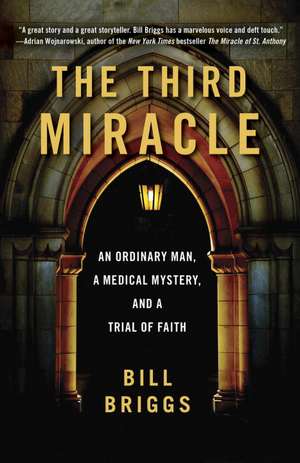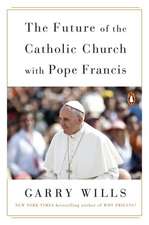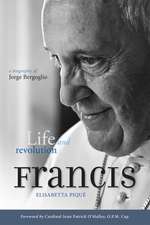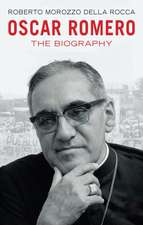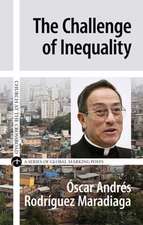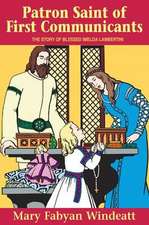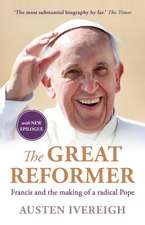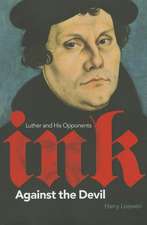The Third Miracle: An Ordinary Man, a Medical Mystery, and a Trial of Faith
Autor Bill Briggsen Limba Engleză Paperback – 12 noi 2012
On a raw January 2001 morning at a Catholic convent deep in the Indiana woods, a Baptist handyman named Phil McCord made an urgent plea to God. He was by no means a religious man but he was a desperate man. McCord’s right eye was a furious shade of red and had pulsed for months in the wake of cataract surgery. He had one shot at recovery: a risky procedure that would replace part of his diseased eye with healthy tissue from a corpse. Dreading the grisly operation, McCord stopped into the convent’s chapel and offered a prayer—a spontaneous and fumbling request of God: Can you help me get through this? He merely hoped for inner peace, but when McCord awoke the next day, his eye was better—suddenly and shockingly better. Without surgery. Without medicine. And no doctor could explain it. Many would argue that Mother Théodore Guérin, the long-deceased matriarchal founder of the convent, had “interceded” on McCord’s behalf. Was the healing of Phil McCord’s eye a miracle?
That was a question that the Catholic Church and the pope himself would ultimately decide. As part of an ancient and little-known process, top Catholic officials would convene a confidential tribunal to examine the handyman’s healing, to verify whether his recovery defied the laws of nature. They would formally summon McCord, his doctors, coworkers, and family to a windowless basement room at the Archdiocese of Indianapolis. They would appoint two local priests to serve the roles of judge and prosecutor. And they would put this alleged miracle on trial, all in an effort to determine if Mother Théodore, whose cause for beatification and canonization dated back to 1909, should be named the eighth American saint.
In The Third Miracle, journalist Bill Briggs meticulously chronicles the Church investigation into this mysterious healing and offers a unique window into the ritualistic world of the secretive Catholic saint-making process—one of the very foundations on which the Church is built. With exclusive access to the case and its players, Briggs gives readers a front-row seat inside the closed-door drama as doctors are grilled about the supernatural, priests doggedly hunt for soft spots in the claim, and McCord comes to terms with the metaphorical “third miracle”: his own reconciliation with the metaphysical. As the inquiry shifts from the American heartland to an awaiting jury at Vatican City in Rome, Briggs astutely probes our hunger for everyday miracles in an age of technology, the Catholic Church’s surprisingly active saint-making operation, and the eternal clash of faith and science.
From the Hardcover edition.
Preț: 115.01 lei
Nou
Puncte Express: 173
Preț estimativ în valută:
22.01€ • 22.70$ • 18.37£
22.01€ • 22.70$ • 18.37£
Carte disponibilă
Livrare economică 05-19 martie
Preluare comenzi: 021 569.72.76
Specificații
ISBN-13: 9780767932714
ISBN-10: 0767932714
Pagini: 334
Dimensiuni: 134 x 203 x 20 mm
Greutate: 0.3 kg
Editura: BROADWAY BOOKS
ISBN-10: 0767932714
Pagini: 334
Dimensiuni: 134 x 203 x 20 mm
Greutate: 0.3 kg
Editura: BROADWAY BOOKS
Notă biografică
BILL BRIGGS writes for MSNBC.com, covering business, travel, and health. He is the coauthor of Amped: A Soldier’s Race for Gold in the Shadow of War (Wiley, 2008). He earned seven national writing awards for the Denver Post, from investigative journalism to humor pieces. His articles ranged from an exposé on a sexual predator coaching youth basketball to a series of stories revealing dysfunction and financial irregularities within the U.S. Olympic Committee. Briggs also has written for the Financial Times, the Miami Herald, and the Nashville Banner, covering business, sports, health, travel, and crime. Briggs has one daughter, Andrea, a college student. He lives in Denver, Colorado, with his wife, Nancy.
From the Hardcover edition.
From the Hardcover edition.
Extras
Prologue
The convent’s caretaker was an ordinary man. Quiet and industrious. Good with his hands. Good with people. And while he rarely spoke of himself, if pressed, the caretaker would say he was diligent, clever, and careful about protecting precious things— such as his family and his planet. He wasn’t Catholic.
Of course, that never stopped the nuns from liking Phil McCord. He always fixed what was broken. In his fifty- plus years, the caretaker had pondered and solved many conundrums— like snarled plumbing and leaky roofs, like who he was and why he was here. But after his baffling overnight cure, McCord faced new questions. And some of those questions bothered him deeply.
Had he really deserved God’s help? Would he ever receive a bill for his divine favor? If that bill came due, how much would it cost him?
The caretaker was shaped by an endless appetite to see and to grasp the intricate machinery of this world and beyond. He peered past the obvious surface, past accepted explanations. He ripped apart riddles, busted them down to better comprehend their complexities. How did electricity work? How did a biomass furnace function? How much of our paths were forged by self- determination and how much by a higher power? By McCord’s estimation, people generally made their own choices and their own way in this life, and rarely— very rarely— did God step in. He compared his own vision of faith to the massive web of National Security Agency supercomputers that simultaneously eavesdropped on millions of e- mail chats and phone conversations.
“They listen to everything and occasionally they pick up one snippet of something. I look at it like that: God doesn’t micromanage but when something pops up, when there’s an opportunity to do something with meaning, there will be an intervention.”
That was one of the lessons he had learned after he beat the incalculable odds and suddenly got better.
In blue jeans and a gray beard, the caretaker mirrored his humble, homey surroundings. Indiana was his land, and the place had branded him with certain essential values: Earn your keep, mend your own problems, and hash out your big decisions at the supper table. That was where he spent the better part of each evening, sitting across from his wife. She once had been a farm girl. Now she was a nurse. A touch sarcastic, she had seen a lot of blood and a lot of death. She kept him grounded.
“I wonder what all this means?” he posed one night as they shared another steaming meal at the circular wooden table nestled just off their kitchen, next to a bay window. She usually just listened quietly for a while, letting him vent, letting him search.
“Was I just at the right place, at the right time? Am I worthy? How did this happen? How did that work? What caused it? It wasn’t like there was a bolt of lightning or something. I don’t understand.”
“I’ve seen people walk away from so much worse,” she finally answered. “It is what it is. Deal with it. It happens. I’ve seen it. In fact, I’ve seen a lot of it. Accept it.”
If only I could, he thought. If only it was that easy.
Looking back at his trial in 2003, he had done just as the priests had asked. He had told the truth. Yet long after he had watched the priests smile at his miraculous tale, the caretaker fought to find some context in which he could understand those facts, some universe in which that truth made sense.
Before his swift recovery, he had been so frightened. So anxious and desperate. At least now he was healthy. He had found new vision. But he had not yet found peace. He still could not answer his own immense questions. He still had not cracked the most perplexing mystery of all.
The convent’s caretaker was an ordinary man. Quiet and industrious. Good with his hands. Good with people. And while he rarely spoke of himself, if pressed, the caretaker would say he was diligent, clever, and careful about protecting precious things— such as his family and his planet. He wasn’t Catholic.
Of course, that never stopped the nuns from liking Phil McCord. He always fixed what was broken. In his fifty- plus years, the caretaker had pondered and solved many conundrums— like snarled plumbing and leaky roofs, like who he was and why he was here. But after his baffling overnight cure, McCord faced new questions. And some of those questions bothered him deeply.
Had he really deserved God’s help? Would he ever receive a bill for his divine favor? If that bill came due, how much would it cost him?
The caretaker was shaped by an endless appetite to see and to grasp the intricate machinery of this world and beyond. He peered past the obvious surface, past accepted explanations. He ripped apart riddles, busted them down to better comprehend their complexities. How did electricity work? How did a biomass furnace function? How much of our paths were forged by self- determination and how much by a higher power? By McCord’s estimation, people generally made their own choices and their own way in this life, and rarely— very rarely— did God step in. He compared his own vision of faith to the massive web of National Security Agency supercomputers that simultaneously eavesdropped on millions of e- mail chats and phone conversations.
“They listen to everything and occasionally they pick up one snippet of something. I look at it like that: God doesn’t micromanage but when something pops up, when there’s an opportunity to do something with meaning, there will be an intervention.”
That was one of the lessons he had learned after he beat the incalculable odds and suddenly got better.
In blue jeans and a gray beard, the caretaker mirrored his humble, homey surroundings. Indiana was his land, and the place had branded him with certain essential values: Earn your keep, mend your own problems, and hash out your big decisions at the supper table. That was where he spent the better part of each evening, sitting across from his wife. She once had been a farm girl. Now she was a nurse. A touch sarcastic, she had seen a lot of blood and a lot of death. She kept him grounded.
“I wonder what all this means?” he posed one night as they shared another steaming meal at the circular wooden table nestled just off their kitchen, next to a bay window. She usually just listened quietly for a while, letting him vent, letting him search.
“Was I just at the right place, at the right time? Am I worthy? How did this happen? How did that work? What caused it? It wasn’t like there was a bolt of lightning or something. I don’t understand.”
“I’ve seen people walk away from so much worse,” she finally answered. “It is what it is. Deal with it. It happens. I’ve seen it. In fact, I’ve seen a lot of it. Accept it.”
If only I could, he thought. If only it was that easy.
Looking back at his trial in 2003, he had done just as the priests had asked. He had told the truth. Yet long after he had watched the priests smile at his miraculous tale, the caretaker fought to find some context in which he could understand those facts, some universe in which that truth made sense.
Before his swift recovery, he had been so frightened. So anxious and desperate. At least now he was healthy. He had found new vision. But he had not yet found peace. He still could not answer his own immense questions. He still had not cracked the most perplexing mystery of all.
Recenzii
“Bill Briggs is that rare journalist who can report like a bulldog and write like a poet.”
—Mark Obmascik, author of The Big Year: A Tale of Man, Nature, and Fowl Obsession
“This book has the two most important ingredients for great nonfiction: a great story and a great storyteller. Bill Briggs has a marvelous voice and deft touch.”
—Adrian Wojnarowski, author of the New York Times bestseller The Miracle of St. Anthony
"[An] intriguing glimpse into the Vatican saint-making process….In page-turning prose, Briggs details not only the process by which [one] miracle was authenticated by the church, but also the personal disquiet felt by the recipient, who was forced to ask the question—why me?” --Kirkus Reviews
From the Hardcover edition.
—Mark Obmascik, author of The Big Year: A Tale of Man, Nature, and Fowl Obsession
“This book has the two most important ingredients for great nonfiction: a great story and a great storyteller. Bill Briggs has a marvelous voice and deft touch.”
—Adrian Wojnarowski, author of the New York Times bestseller The Miracle of St. Anthony
"[An] intriguing glimpse into the Vatican saint-making process….In page-turning prose, Briggs details not only the process by which [one] miracle was authenticated by the church, but also the personal disquiet felt by the recipient, who was forced to ask the question—why me?” --Kirkus Reviews
From the Hardcover edition.
